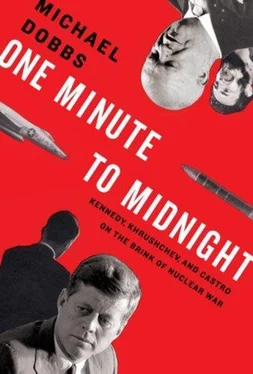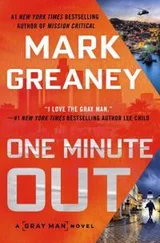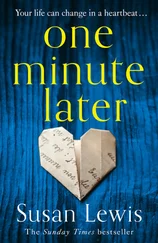A roar of tanks, missile carriers, and marching soldiers drifted over the redbrick walls of the Kremlin into the Presidium meeting room as Malinovsky spoke. Among the examples of heavy weaponry trundling through Red Square was the R-12 missile now in Cuba, escorted by troops of the Strategic Rocket Forces, the elite military arm responsible for nuclear weapons. Presidium members were too preoccupied with the looming confrontation with the rival superpower to pay much attention. They knew that the awe-inspiring display of military might beneath their windows was simply a dress rehearsal for the annual Revolution Day parade.
The immediate reactions of the two superpower leaders when confronted by the gravest international crisis of their careers were much the same: shock, wounded pride, grim determination, and barely repressed fear. Kennedy had wanted to bomb the Soviet missile sites; Khrushchev contemplated the use of tactical nuclear weapons against American troops. Either option could easily have led to full-scale nuclear war.
While their initial instincts may have been similar, it is difficult to think of two more different personalities than John Fitzgerald Kennedy and Nikita Sergeyevich Khrushchev. One was the son of an American millionaire, born and bred to a life of privilege. The other was the son of a Ukrainian peasant, who went barefoot as a child and wiped his nose on his sleeve. One man’s rise seemed effortless and natural; the other had clawed his way up through a combination of sycophancy and ruthlessness. One was introspective, the other explosive. The differences extended even to their looks—lean and graceful with a full head of hair versus short, plump, and bald—and their family lives. One wife looked as if she had stepped out of the pages of a fashion magazine; the other was the archetypal Russian babushka.
The sixty-eight-year-old Khrushchev was the product of one of the toughest political schools imaginable: a despot’s court. His meteoric ascent was due not to his public appeal but to his skill at pleasing Stalin and playing the bureaucratic game. He had learned that politics is a dirty business, requiring vast reserves of guile and patience. He knew how to win the trust of others, biding his time before mercilessly crushing his rivals from a position of strength. He had a flair for dramatic gestures that took his enemies by surprise, whether denouncing Stalin as a mass murderer, arresting the secret police chief Lavrenty Beria, or launching Sputnik, the world’s first artificial satellite.
Along with cynicism and cruelty, Khrushchev also displayed an idealistic, almost religious streak. He was a fervent believer, not in the afterlife, but in a man-made paradise on earth. The promise of communism had transformed his own life; it could do the same for his fellow country-men. He was convinced that communism would eventually prove itself to be a better, fairer, and more efficient system than capitalism. A Communist society—a state of egalitarian abundance in which everybody’s needs are fully satisfied—would be “just about built” within two decades, he declared in 1961. By that time, the Soviet Union would have overtaken the United States in material wealth.
Khrushchev was proud of his humble roots and his ability to outwit stronger, richer, and more educated opponents. He compared himself to a poor Jewish shoemaker in a Ukrainian fairy tale, who is ignored and scorned by everybody but chosen as their leader because of his courage and energy. On another occasion, he said politics was “like the old joke about the two Jews traveling on a train.” One Jew asks the other, “Where are you going?” and gets the reply, “To Zhitomir.” “What a sly fox,” thinks the first Jew. “I know he’s really going to Zhitomir, but he told me Zhitomir so I’ll think he is going to Zhmerinka.” Taken together, the two stories captured Khrushchev’s view of politics as a game of bluff and daring.
Dealing with Kennedy was child’s play compared with dealing with monsters like Stalin and Beria. “Not strong enough,” Khrushchev remarked after meeting JFK in Vienna. “Too intelligent and too weak.” The difference in their ages—Khrushchev was twenty-three years older than Kennedy—was also apparent. The U.S. president was “young enough to be my son,” the first secretary noted. Although Khrushchev later confessed to “feeling a bit sorry” for Kennedy in Vienna, he did not let that stand in the way of giving his rival a brutal dressing-down. He understood that politics was “a merciless business.”
Khrushchev’s approach to international relations was shaped by his awareness of Soviet weakness. While his public persona was that of the blustering bully, he felt far from confident in the summer of 1962. The Soviet Union was surrounded by American military bases, from Turkey in the West to Japan in the East. America had many more nuclear missiles targeted on the USSR than vice versa. An ideological schism with China threatened Soviet preeminence in the worldwide Communist movement. For all the boasts about the coming utopia, the country was still struggling to recover from World War II.
Khrushchev had done his best to disguise the fact that the Soviet Union was the weaker superpower with spectacular public relations feats. He had launched the first man into space and tested the world’s largest nuclear bomb. “America recognizes only strength,” he told associates. His son Sergei was taken aback when Khrushchev boasted that the Soviet Union was churning out intercontinental rockets “like sausages.” A missile engineer himself, he knew this was not true.
“How can you say that when we only have two or three?” Sergei protested.
“The important thing is to make the Americans believe that,” his father replied. “That way, we prevent an attack.” Sergei concluded that Soviet policy was based on threatening the United States with “weapons we didn’t have.”
As the number two superpower, the Soviet Union had to constantly threaten and bluster in order to be heard. “Your voice must impress people with its certainty,” Khrushchev told his Presidium colleagues in January 1962. “Don’t be afraid to bring it to a white heat, otherwise we won’t get anything.”
There was a big difference, however, between deliberately bringing international tensions to a boiling point and permitting the pot to boil over. The purpose of the missile deployment, Khrushchev kept emphasizing, was not “to start a war” but to give the Americans a taste of “their own medicine.”
Although Khrushchev initially preferred the Democrat Kennedy to the Republican Eisenhower, he had come to regard the two presidents as made from “the same shit.” Spending the summer at his villa in Sochi, on the shores of the Black Sea, he seethed with resentment over the presence of American nuclear warheads just across the water in Turkey, five minutes’ flying time away. He would hand visitors a pair of binoculars and ask them what they could see. When the mystified guests described an endless vista of water, Khrushchev would grab the binoculars and announce angrily: “I see U.S. missiles, aimed at my dacha. ” But he was cheered by the thought of the surprise he was about to spring.
“It’s been a long time since you could spank us like a little boy,” Khrushchev told a mystified U.S. secretary of the interior, Stewart Udall, in Sochi back in September. “Now we can swat your ass.”
4:00 P.M. MONDAY, OCTOBER 22
It was, thought Kennedy, the “best kept secret” of his administration. A group known as the ExComm, the Executive Committee of the National Security Council, made up of the president and twelve of his most trusted aides, had been debating the mounting crisis in Cuba for six days, without any leaks to the press. The White House had done everything possible to keep the story out of the newspapers. At one point, nine ExComm members had piled into the same car to avoid the spectacle of a long line of official limousines arriving for a crisis meeting at the White House. Distinguished cabinet officers like Bob McNamara and John McCone were reduced to sitting in each other’s laps.
Читать дальше












